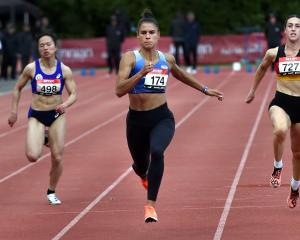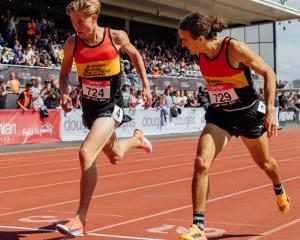Born into Brazil's legendary martial arts family, Royler Gracie has been fighting all his life. Sean Flaherty met him in Dunedin.
Royler Gracie has the Zen calm of the master athlete.
If he seems to move more slowly than the rest of us, it's only because he's seeing the world at twice the speed.
He sits smiling on the mats at Dunedin's NZ Fight and Fitness Academy, a gentle, super-healthy 48-year-old father of four daughters who loves to surf.
You wouldn't guess he was trained from birth by his father, Helio, to be a Gracie killing machine.
• ''I like to fight,'' Royler says.
''It puts everything on one plate.''
This is a nice way of saying in one-on-one combat you're subjecting yourself to the ultimate test against another human being. Nowhere to hide and no excuses.
At the same time, the purity of action and thought can be akin to a religious experience which explains why many fighters find it so hard to give up.
Royler (pronounced Hoyler) is no different, having been coaxed out of retirement earlier this year for a grudge match with old jiu-jitsu enemy Eddie Bravo.
It was a draw, which naturally opens the door to another rematch. So would he be open to a third fight as he approaches the age of 50?
''If people want to watch, I would, but it's not going to happen. I've got other priorities in my life,'' he says softly.
In other words, yes.
• Royler started jiu-jitsu when he was 3 years old at the academy run by his father in Rio de Janeiro.
Helio, it has to be said, was not your regular dad.
His driving ambition was to develop an art that could enable someone to defend themselves against a larger opponent, so he began adapting Japanese jiu-jitsu to his skinny frame.
Then, with a confidence in the system matched only by their marketing skills, he and brother Carlos started challenging all-comers to fights.
The Gracie Challenge was an audacious and highly successful ploy, especially when the Gracies made a habit of not losing.
Helio wasn't opposed to placing himself in great physical danger to prove his points and took on the Japanese judo champion, Kimura, who outweighed him by 35kg, in front of a huge crowd in Rio in 1951.
Kimura said if Helio lasted more than three minutes, it was a victory for the Brazilian.
Helio lasted 13 minutes before being defeated by the arm-lock which now bears Kimura's name.
Royler's family story is full of such colourful anecdotes but its legacy was cemented when his brother, Rorion, started the Ultimate Fighting Championship, which has morphed into today's hyper-charged UFC.
Looking back, the early UFCs are eccentric affairs with boxers, sumo wrestlers, high-kicking karate guys, tricky grapplers and jiu-jitsu proponents all competing under the same roof, many in the attire of their chosen discipline.
So it was in UFC 1 that Royler's brother, Royce, came up against Ken Shamrock, described by United States television as ''the world's most dangerous man''.
Shamrock was an extremely powerful athlete with rippling abs who looked like he would be more at home fighting Hulk Hogan.
But he was also a highly accomplished grappler who had won his first-round fight with a technical leg lock.
In perhaps the defining moment of the dawn of modern mixed martial arts, Royce, wearing a jiu-jitsu gi, took on this fighting monster in November 1993.
The bigger Shamrock had the early advantage and went for another leg-lock submission.
But Royce, who'd spent every day of his life battling an army of brothers and cousins out to take his head off, stayed calm and slowly improved his position before choking Shamrock out.
In the post-fight interview the shell-shocked American is unable to explain what happened.
He looks like he's just been mugged by an alien.
Gracie jiu-jitsu had arrived.
• Royler says virtually every top 10 fighter in today's UFC is a jiu-jitsu black belt.
You might be able to punch and kick but if you've got no ground game you've got no chance.
In this way, the octagon is no different from the street.
Helio Gracie realised that the majority of street fights end up on the ground, so this is where he would base his system.
As well as being an obsessive physical technician, he was also a master psychologist.
''If you say something negative then that's what kids are going to bring home. We're positive,'' Royler explains.
''My father and my brothers were always saying, 'Man, you look so strong.'
"I'm not the good looking one at home but always they were saying, 'You're so handsome'. And at the end of the day it makes you feel good.''
He rejects the idea that his father ever pressured him.
''My father never pushed me. He just left me alone.
"He said if you don't train then you're going have to call your brothers to help you if you get in trouble.''
Famously, when the seven brothers started competing their father would offer them more money if they lost than when they won.
''He'd say, 'If you lose I'll give you 20 bucks. If you win I'll give you 10.' The first competition I entered I lost and I got more money than my brothers and this made me happy.''
So follows the Gracie maxim that you're either winning, or you're learning.
Royler learnt well. Very well.
He rose through the jiu-jitsu ranks to become world champion on four occasions and, despite being only 70kg, was unafraid to also enter the open class against the big boys where he won a world championship bronze medal in 1997.
He also made the brutal transition to MMA, with his wins including a 33-minute epic over 110kg Japanese wrestler Naoki Sano in Pride 2.
He's used to being asked whether being a Gracie adds extra pressure when competing.
''I never feel the pressure. Because, you know, I do my homework.
"If there's something going wrong there's something going wrong.
"And that's what my father always tried to teach me. Win and lose is a part of the game. If you don't like to lose better don't compete.''
Now based in San Diego, Royler and wife Vera have four daughters, all of whom are trained in jiu-jitsu for self defence without following the competitive route.
He travels a lot, giving seminars at the worldwide network of Gracie Humaita schools which includes the Dunedin academy run by Ryan Henry with its thriving youth class and 60-strong adult membership.
He says he's worked hard to get to this position - and he's now starting to relax a little.
''If I'm at home, I wake up and maybe go and surf. If there's no waves I'll go running or lift weights a bit.
"Most of the time I go to the gym in the evenings with a big group class.
"I put my gi on top of my shoulder like everybody else and walk to the school, roll (spar) a couple of guys and go home.''
Does he ever think what his life would have been like without jiu-jitsu?
''One time my father asked me, 'Imagine if you don't have jiu-jitsu in your life. It's gonna be boring, no? How much money would I have to pay you to not talk about jiu-jitsu any more in life?'
''I said: 'You need to kill me.''
'












